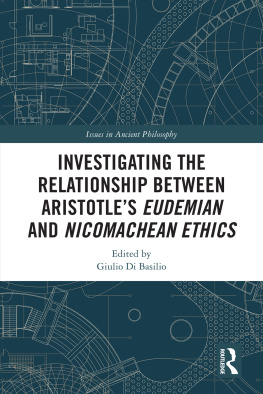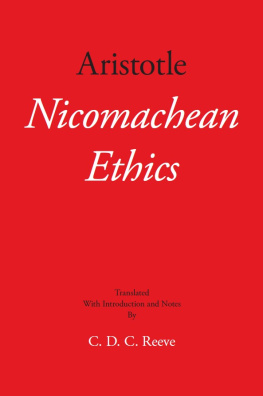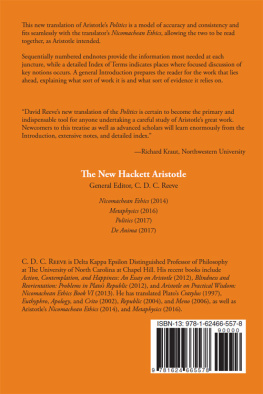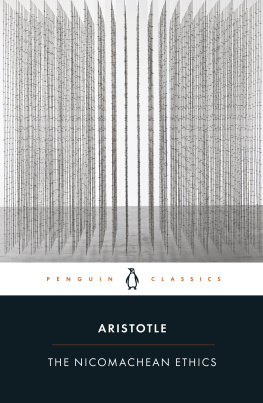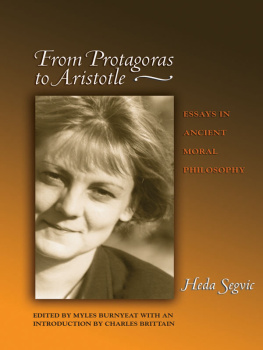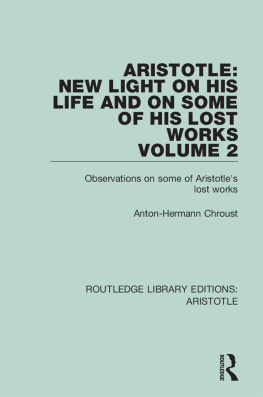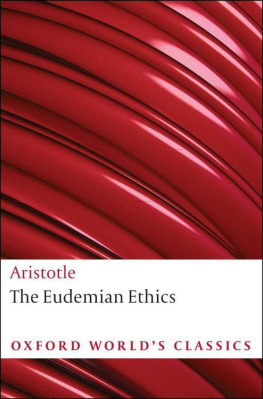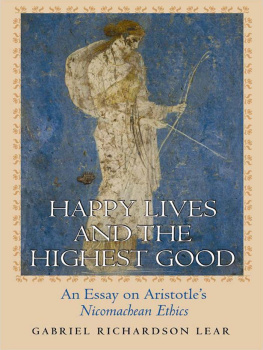Aristotle David - The Nicomachean Ethics
Here you can read online Aristotle David - The Nicomachean Ethics full text of the book (entire story) in english for free. Download pdf and epub, get meaning, cover and reviews about this ebook. year: 2009, publisher: OUP Oxford, genre: Science. Description of the work, (preface) as well as reviews are available. Best literature library LitArk.com created for fans of good reading and offers a wide selection of genres:
Romance novel
Science fiction
Adventure
Detective
Science
History
Home and family
Prose
Art
Politics
Computer
Non-fiction
Religion
Business
Children
Humor
Choose a favorite category and find really read worthwhile books. Enjoy immersion in the world of imagination, feel the emotions of the characters or learn something new for yourself, make an fascinating discovery.

- Book:The Nicomachean Ethics
- Author:
- Publisher:OUP Oxford
- Genre:
- Year:2009
- Rating:5 / 5
- Favourites:Add to favourites
- Your mark:
- 100
- 1
- 2
- 3
- 4
- 5
The Nicomachean Ethics: summary, description and annotation
We offer to read an annotation, description, summary or preface (depends on what the author of the book "The Nicomachean Ethics" wrote himself). If you haven't found the necessary information about the book — write in the comments, we will try to find it.
The Nicomachean Ethics — read online for free the complete book (whole text) full work
Below is the text of the book, divided by pages. System saving the place of the last page read, allows you to conveniently read the book "The Nicomachean Ethics" online for free, without having to search again every time where you left off. Put a bookmark, and you can go to the page where you finished reading at any time.
Font size:
Interval:
Bookmark:
OXFORD WORLDS CLASSICS
THE NICOMACHEAN ETHICS
ARISTOTLE (384322 BC), with Plato one of the two greatest philosophers of antiquity, and in the view of many the greatest philosopher of all time, lived and taught in Athens for most of his career. He began as a pupil of Plato, and for some time acted as tutor to Alexander the Great. He left writings on a prodigious variety of subjects, covering the whole field of knowledge from biology and astronomy to rhetoric and literary criticism, from political theory to the most abstract reaches of philosophy. He wrote two treatises on ethics, called Eudemian and Nicomachean after their first editors, his pupil Eudemus and his son Nicomachus. The Nicomachean Ethics was probably written later, in Aristotles fifties and sixties, when he was head of the Lyceum, the school he founded in Athens.
SIR DAVID ROSS (18771971) was Provost of Oriel College and Deputy Professor of Moral Philosophy at Oxford. He was the author of important editions of many of Aristotles works, and acted as General Editor of the complete Oxford Translation of Aristotle, for which the present translation was first written.
LESLEY BROWN is Centenary Fellow and Tutor at Somerville College, Oxford, and a University Lecturer in the Philosophy Faculty, University of Oxford.
OXFORD WORLDS CLASSICS
For over 100 years Oxford Worlds Classics have brought readers closer to the worlds great literature. Now with over 700 titlesfrom the 4,000-year-old myths of Mesopotamia to the twentieth centurys greatest novelsthe series makes available lesser-known as well as celebrated writing.
The pocket-sized hardbacks of the early years contained introductions by Virginia Woolf, T. S. Eliot, Graham Greene, and other literary figures which enriched the experience of reading. Today the series is recognized for its fine scholarship and reliability in texts that span world literature, drama and poetry, religion, philosophy, and politics. Each edition includes perceptive commentary and essential background information to meet the changing needs of readers.
Refer to the to navigate through the material in this Oxford Worlds Classics ebook. Use the asterisks (*) throughout the text to access the hyperlinked Explanatory Notes.
OXFORD WORLDS CLASSICS

ARISTOTLE

Translated by
DAVID ROSS
Revised with an Introduction and Notes by
LESLEY BROWN


Great Clarendon Street, Oxford OX2 6DP
Oxford University Press is a department of the University of Oxford.
It furthers the Universitys objective of excellence in research, scholarship,
and education by publishing worldwide in
Oxford New York
Auckland Cape Town Dar es Salaam Hong Kong Karachi
Kuala Lumpur Madrid Melbourne Mexico City Nairobi
New Delhi Shanghai Taipei Toronto
With offices in
Argentina Austria Brazil Chile Czech Republic France Greece
Guatemala Hungary Italy Japan Poland Portugal Singapore
South Korea Switzerland Thailand Turkey Ukraine Vietnam
Oxford is a registered trade mark of Oxford University Press
in the UK and in certain other countries
Published in the United States
by Oxford University Press Inc., New York
Editorial material Lesley Brown 2009
The moral rights of the author have been asserted
Database right Oxford University Press (maker)
First published as a Worlds Classics paperback 1980
This edition first published as an Oxford Worlds Classics paperback 2009
All rights reserved. No part of this publication may be reproduced, stored in a retrieval system, or transmitted, in any form or by any means, without the prior permission in writing of Oxford University Press, or as expressly permitted by law, or under terms agreed with the appropriate reprographics rights organization. Enquiries concerning reproduction outside the scope of the above should be sent to the Rights Department, Oxford University Press, at the address above
You must not circulate this book in any other binding or cover
and you must impose the same condition on any acquirer
British Library Cataloguing in Publication Data
Data available
Library of Congress Cataloging-in-Publication Data
Aristotle.
[Nicomachean Ethics. English]
The Nicomachean Ethics/Aristotle; translated by David Ross; revised with an
introduction and notes by Lesley Brown.
p. cm.
Includes bibliographical references and index.
ISBN 9780199213610
1. Ethics. I. Ross, W. D. (William David), 18771971. II. Brown, Lesley, 1944
III. Title. B430.A5R67 2009
171.3dc22
2009005379
Typeset by Cepha Imaging Private Ltd., Bangalore, India
Printed in Great Britain
on acid-free paper by
Clays Ltd., St Ives plc
ISBN 9780199213610
1 3 5 7 9 10 8 6 4 2
ARISTOTLE was the first Western thinker to divide philosophy into branches which are still recognizable today: logic, metaphysics, natural philosophy, philosophy of mind, ethics and politics, rhetoric; he made major contributions in all these fields. He was born in Stagira, a city of northern Greece, in 384 BC. His father Nicomachus was a doctor at the court of Amyntas of Macedon, who preceded Philip, the conqueror of much of Greece. Aristotle later served as tutor to Philips remarkable son, Alexander the Great.
As a young man Aristotle went to Athens in 367 to study with Plato at his Academy, remaining there until Platos death in 347. This was a period in which Plato wrote works such as Timaeus, Sophist, Statesman, and Philebus, as well as his Laws, and it is intriguing to ask how much these owe to the challenges from his brilliant pupil Aristotle. After a period in Asia Minor (where he may have pursued research for his biological works) and then back in Macedon as tutor, Aristotle returned to Athens and founded his own philosophical school, the Lyceum: some of its remains have been recently discovered in modern Athens. He died in 322 BC, a year after he had to leave Athens in the wake of the death of his former pupil, the emperor Alexander.
Apart from a few fragments of more popular works, the writings that have come down to us are academic treatises, some more, some less polished. They were not published, in any modern sense, and Aristotle may have continued to revise them. The breadth and character of the teaching at the Lyceum can be gauged from the surviving treatises, which cover an immense range, and are always cast in a questioning, argumentative, and non-dogmatic style. It may be that the works as they survive are lecture-notes, and this would indeed account for some of the rougher features. The fact is that we know little about their original form and purpose, the order in which they were written or how they were edited.
Three works on ethics have come down under his name: Nicomachean Ethics (NE) in ten books, Eudemian Ethics (EE) in eight books, and the so-called Magna Moralia or great ethics. Some parts are more polished than others, and in one of the common books (Book V, on justice) some material seems out of place. Aristotles writing has a certain terse elegance, and it is ideally suited to the presentation of arguments, in which his philosophy abounds. The work opens with a discussion of happiness, then moves to the moral virtuesthe virtues of characterincluding justice; and to the virtues of the intellect; it discusses pleasure and friendship and its role in the best life, returning to a further discussion of happiness, then a final transition to political theory. Aristotle regards ethics as a branch of politics, and his work
Next pageFont size:
Interval:
Bookmark:
Similar books «The Nicomachean Ethics»
Look at similar books to The Nicomachean Ethics. We have selected literature similar in name and meaning in the hope of providing readers with more options to find new, interesting, not yet read works.
Discussion, reviews of the book The Nicomachean Ethics and just readers' own opinions. Leave your comments, write what you think about the work, its meaning or the main characters. Specify what exactly you liked and what you didn't like, and why you think so.

